
If you are facing eviction, the most important step is to act quickly. Time matters, because once your landlord files in court, your options shrink. The goal in the first hour is to stop the eviction process from moving forward and show good faith that you want to pay.
Many landlords are more willing to work with tenants who reach out early. Call your landlord and explain why payment was delayed. Let them know what steps you are taking, such as applying for emergency rental assistance or setting up a payment plan. A short phone call followed by a written letter can prevent a formal eviction filing.
If you received a notice, save a copy and mark any court or payment dates on your calendar. Keeping clear records is essential. Use forms, letters, or reports to track communication. If your case goes to court, documentation can show the judge you took the situation seriously.
Emergency rental assistance is the main program designed to stop eviction by covering overdue housing costs. It does more than just pay rent.
Housing expenses include rent, utility bills, and sometimes security deposits or moving costs. These programs were created to cover both ongoing rent and overdue balances. They also protect tenants by preventing utility shutoffs.
Eligibility depends on household income, state or territory rules, and whether you are at risk of eviction. Most programs require proof of income, a lease agreement, and overdue rent or utility bills. You may need to provide forms, reports, or letters showing your situation.
The emergency rental assistance program (ERA) was funded by the federal government during the pandemic and is still active in many states. It helps households pay rent, utilities, and other costs. Funds move from the federal level to state and local programs.
Emergency rental assistance is administered locally, so the exact process depends on where you live. Start by visiting your city or state program’s website or calling the administering office directly. Many programs allow you to apply through an online portal, but in-person applications are still available in many areas.
If you apply in person, bring basic documents like your lease, recent utility bills, and a photo ID. Having these ready can prevent unnecessary delays.
Incomplete applications are one of the most common reasons ERA requests stall. Programs typically won’t review your case until required documents are received.
Most programs ask for proof of income, a copy of your lease, statements showing overdue rent, and recent utility bills. Upload clear copies of reports, letters, or forms that demonstrate both your housing costs and your financial hardship.
If a document is missing, do not abandon the application. Contact the program administrator and explain what you’re missing. Many agencies accept alternate documentation, such as bank statements, pay stubs, or a written confirmation from your landlord. Local nonprofits and community organizations can also help you track down or substitute required paperwork.
If overdue utility bills or food costs are draining your budget, you may qualify for financial assistance beyond rent. Covering these expenses frees up money for housing and reduces the risk of eviction.
Most utility companies offer payment plans, budget billing, or discounts for eligible households. Ask your provider about monthly expenses that can be reduced through these programs.
Food assistance can also free up money for rent. Apply for SNAP if eligible, or visit local food pantries. Community action agencies often provide services to help households facing eviction.
If your landlord files in court, you still have options. Legal help can slow down or even stop eviction, especially if your rights are violated.
Bring copies of your application, proof of payments, and any communication with your landlord. Judges often want to see that you made an effort to resolve the issue. Respond to notices quickly and meet all required deadlines.
Submitting a complete application reduces delays and increases your chance of approval.
Programs want to see that you can manage rent after receiving aid. Create a simple budget listing income, monthly expenses, and rent. Show how the assistance will stabilize your housing.
Most programs ask you to explain why you fell behind. Write a statement linking your situation to financial hardship, job loss, medical costs, or the pandemic. Keep it short but clear, and match the language used in program guidelines.
The process doesn’t end after you apply. You must stay on top of updates.
Save your case number and check your email daily. If the provider requests additional information, respond quickly. Unanswered requests may cause your application to be denied.
When your application is approved, confirm how and when payments will be sent. Some programs pay landlords directly. Ask for a report or letter showing payment dates and amounts.

A denial is not always the end. Many programs allow appeals or resubmissions.
Applications are often denied because forms are incomplete, documents are missing, or income limits were not clear. Review the notice, correct errors, and reapply.
If one program denies your request, look for another. Many states and communities operate multiple aid programs. Visit local or state websites, call 211, or ask community providers about additional options.
Your landlord plays a role in the process. Many ERA programs require landlord participation. Keeping communication open can help prevent an eviction filing.
Write a letter stating that you applied, include your case number, and provide an expected timeline for payment. Ask your landlord to pause eviction while the application is processed.
If possible, get your landlord to sign an agreement that they will not file eviction while your case is pending. This protects you if they later take legal action.
Some information must come from third parties. Programs often verify your income and housing costs.
Employers may need to provide a letter showing wages. Utility companies may issue reports of overdue bills. Landlords may be asked to confirm the rental agreement. Collecting these quickly can speed up approval.
Unfortunately, scammers target renters in crisis.
No real program charges a fee for an application. Federal and state portals are always free. Avoid third-party websites that promise quick approval for a price. Always apply through official state, local, or U.S. government sites.
Renters have rights under both state and federal law. Knowing them can help you defend yourself in court.
Eviction is a legal process, and it usually unfolds over weeks, not days. In most states, a landlord must first provide written notice and wait through a required notice period before filing a court case. During that time, tenants are not automatically locked out and may still have ways to respond.
In some states, tenants can stop an eviction by paying overdue rent before a court hearing. This is often referred to as “pay and stay.” The rules vary by location, including how much must be paid and when payment must be made. Understanding whether this option exists where you live can affect how much time you have and what steps make sense next.
Not every household fits neatly into standard application categories. Emergency rental assistance programs recognize this, but applicants in certain situations often need to take a more active role in explaining their circumstances.
Income that changes from month to month can slow an application if it is not documented clearly. Self-employed renters and gig workers are often able to verify income using tax returns, bank statements, invoices, or payment histories from recent work. Some programs also accept short statements from clients or platforms confirming ongoing work.
Fluctuations in income are common and not disqualifying. What matters is showing how average earnings, combined with assistance, can support rent going forward.
Households dealing with domestic violence, disability, or serious medical conditions may be eligible for additional protections or faster review. Many programs have specific provisions that limit eviction actions or allow more flexibility with documentation in these cases.
If any of these situations apply, it is important to ask directly about available accommodations. Program rules often include options that are not obvious unless requested, and relying on the standard process may leave helpful protections unused.
Finding the right office or portal can save time.
Check your state or territory’s housing website for links to local ERA programs. Many states run call centers where staff can help you apply by phone. Local community centers often provide in-person help, especially for households without internet access.
Understanding how funds are delivered helps you track them.
In many emergency rental assistance programs, payments are issued directly to landlords or utility providers instead of being sent to tenants. When that happens, it’s important to confirm how the payment was applied. Ask for written confirmation that shows the amount paid, the date it was processed, and which account or balance it covered.
Hold on to copies of the payment report and any receipts you receive. If questions come up later, including in housing court, having clear records makes it easier to show that the balance was addressed and that you met the program’s requirements.
Stopping an eviction is only one part of the process. Assistance can provide breathing room, but it does not automatically resolve the underlying issues that led to missed payments. What you do after approval plays a major role in whether the situation stabilizes or repeats.
Missed payments are often the result of timing problems rather than lack of effort. Bills may not line up with paydays, or they get lost among other obligations. Using reminders that fit your routine, whether phone alerts, a shared calendar, or a written schedule at home, can help keep payments visible.
Staying current on rent and utilities reduces ongoing stress and lowers the chance of facing another housing emergency a few months later.
Some programs offer follow-up support once assistance is approved. This can include case management, referrals to affordable housing resources, or connections to budgeting and income support services.
If these options are available, it’s worth asking about them early. Continued support can help turn short-term assistance into longer-term housing stability instead of a temporary pause in the crisis.
If you are at risk of eviction, do not wait until the court date. Counselors can help you apply for programs, communicate with landlords, and create a financial plan.
Credit.org’s Rent4Recovery Distressed Renter Counseling gives one-on-one help to renters in crisis. Counselors can guide you through applications, connect you with programs, and offer budgeting support.
Get help today at Rent4Recovery Counseling.